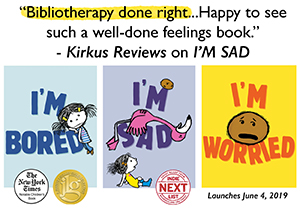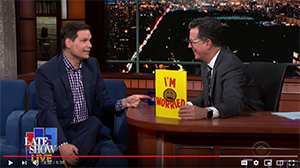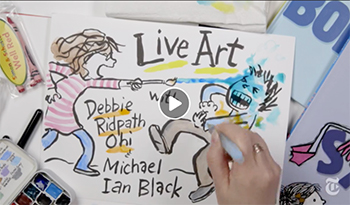copyright
 Thursday, April 26, 2001 at 10:18AM
Thursday, April 26, 2001 at 10:18AM 
Comic updated
A recent entry in one of the online journals I check on a regular basis inspired the topic for today's Blathering. While I was involved with Inkspot, online copyright was an issue frequently misunderstood, resulting in much heated debate.
It's easy to forget that basic rules about intellectual property apply as much online as they do offline. I am guilty of this myself. About a month ago in Blatherchat, John O'Halloran posted a link to a photo of me that he took at Consonance. I actually liked this photo (I usually hate how I look in pictures), and posted the photo at the top of my Blatherings the next day, making sure to credit John. I had assumed that he wouldn't mind, and had gotten too used to asking filker friends for permission to use their photos and having their surprised reaction be, "Of COURSE you can, I can't believe you even asked!"
This was an incorrect assumption. I -should- have asked John for permission first, and he was justified in being upset. I removed the photo and apologized to John as soon as I saw his angry posting on Blatherchat (he also e-mailed me privately). I was deeply embarrassed at having forgotten one of the most basic rules of online copyright, one that I had been so vocal in advocating while working on Inkspot...just because it's online doesn't mean it's free for the taking.
Inkspot and Inklings were plagiarized several times. In all cases, the perpetrators claimed ignorance, that they hadn't realized they were doing anything wrong. Some -were- innocent mistakes. Others not so innocent, like the person who included the entire writers' marketing listing section from each issue of Inklings in his own newsletter without credit, or the writer who basically copied an Inklings article, tweaked the phrasing, then sold the article as one of her own.
Because pretty much everything online is free, people tend to assume that no one would mind if content is redistributed without permission. Even the jokes and funny stories that are constantly recirculated by e-mail could be a breach of copyright laws. It's so easy to cut and paste text (and images) online that most people don't think about the copyright implications.
They also don't think about the amount of effort that might have gone into the content they are ripping off. This online journal entry by Yen of "Shinkansen" gives a great example of this (check out her entry page, by the way...she uses a Mac laptop, woohoo!). I was blown away when I first saw her online journal...the layout, photos, and writing are all wonderful. She obviously put a ton of time into planning the design as well as the look and feel of the site. Recently, Yen discovered that someone else had copied her HTML...they had even forgotten to remove code that made it obvious that the code had been taken from Yen's site. When confronted, the author denied any wrongdoing (and also quietly removed the telltale HTML "tracks').
Yen nicely summarizes the non-legal aspect of copyright in her journal entry:
"I don't think copyright rules have to be on a marquee or framed with stagelights to be stressed clearly enough. All the average sensible person ever needs is to be fairly cognizant about certain rules of ethics. How difficult is it to practice Internet etiquette? It surely is not as complicated as guessing the right spoon at a dinner party. All that is asked of you is to respect other people's work. It is only common sense."
For those interested, Moira Allen (used to be Associate Editor of Inkspot/Inklings) has some great articles about copyright on her site, Writing World (go to her article index and search for the keyword "copyright").
Today's Blatherpic:
My old cubicle at Xlibris. I don't miss it.
Today's Poll Question:
Do you have any commercial software (normally sold for a fee) on your computer right now that you didn't pay for, and that you don't plan to pay for?
 Uncategorized
Uncategorized 








Reader Comments